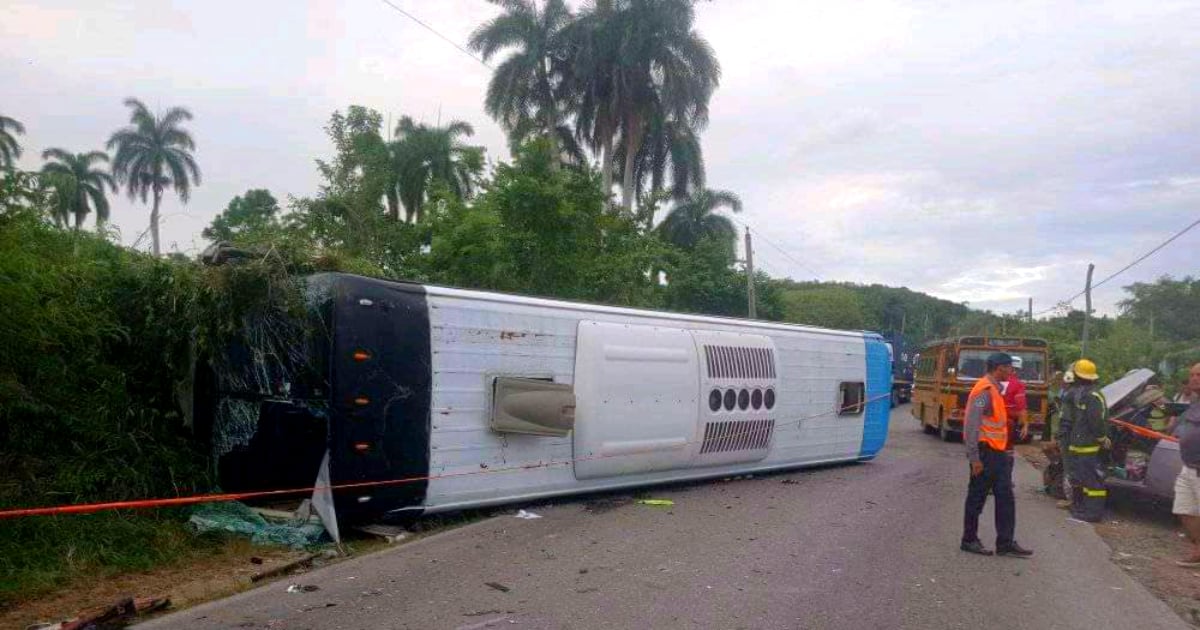
Canadian tourists traveling on the Transgaviota bus that crashed on Sunday afternoon were injured in the incident in which the driver of the other vehicle involved lost his life, leaving a total of 26 injured.
Although the authorities and the official press of the Cuban regime remained silent about the nationality and identity of the injured tourists, the information was published this Monday by Canadian media.
The incident took place last Sunday near the Santa Clara airport, where a Transgaviota company bus, carrying 38 passengers, was hit by a vehicle coming in the opposite direction, resulting in the immediate death of the Cuban driver.
The accident, which has captured international attention, mainly involved tourists from Quebec who were traveling on flight TS715 bound for Montreal. According to TVA Nouvelles, the airline Air Transat reported that some of the injured would return to Canada on Monday night, while others will do so on an additional flight scheduled for Tuesday.
"We are trying to repatriate the travelers involved as quickly as possible," an Air Transat spokesperson told the aforementioned media outlet. According to the plan, the travelers arriving in Canada on Monday would spend the night in Toronto before flying to Montreal the following day, while the plane departing from Cuba on Tuesday will head directly to Montreal.
Complaints about lack of support
Throughout Monday, complaints about the lack of support and information from the airline became increasingly strong among the relatives and friends of the Quebecois tourists involved in the accident.
Michaël Truchon, a citizen of Quebec whose friend and her 9-year-old daughter were involved in the incident, expressed his frustration: "I have traveled several times with Air Transat, it is a company I trusted, but here I find that the support is very poor, even unacceptable, given the situation. Annie needs to return to Quebec as soon as possible to receive the appropriate care. The doctors in Cuba are very good, but their resources are limited."
The airline has not specified how many of the 38 passengers will be repatriated until Tuesday. "Our goal is for everyone to return to the country as soon as possible, but we cannot confirm that all 38 passengers will return tomorrow," the spokesperson mentioned.
This uncertainty has caused concern among the relatives and friends of those affected, who insist on the need for a quick return to receive more comprehensive medical treatments in their home country.
On their part, although local authorities in Cuba hurried to provide medical attention to the injured Canadians (a large deployment of ambulances in perfect condition was reported at the scene), they made an effort to omit information about the identity and nationality of the injured individuals.
Another case that adds to the discredit of the "Cuba destination" in Canada and around the world
The incident this Sunday involving the Transgaviota bus traveling from Cayo Santa Maria to Abel Santamaria International Airport, which left a significant number of Canadian tourists injured, adds to other events that have caused shock and concern among travel agencies, governments, and international tourists.
The most recent and high-profile case has been that of Canadian tourist Faraj Allah Jarjour, who died on March 22 in Cuba while on vacation in Varadero with his family. His body was repatriated to Russia while Cuban authorities sent the body of a Russian corpse to Canada.
The international scandal caused by the colossal error forced the Cuban regime to publicly apologize for the mistake. Other cases of tourists being injured or killed in Cuba in recent times have also been reported by independent media following this tragic incident.
In addition, this Sunday's accident has once again called into question road safety in Cuba, a country that welcomes millions of tourists annually. Although traffic accidents are common, this case has highlighted the need to improve road conditions and driver training to prevent future tragedies.
The fatal accident involving Quebec tourists in Cuba sounds the alarm once again in Canada, one of the main countries sending tourists to Cuba.
While Air Transat works to repatriate the injured as quickly as possible, the lack of support and uncertainty about the return of all passengers have sparked a wave of criticism and concerns about the safety of the Island's tourist infrastructure, as well as the behavior and transparency of Cuban authorities.
Belonging to the Gaviota Group and under the umbrella of the Grupo de Administración Empresarial S.A. (GAESA), controlled by the Cuban regime's military, the company Transgaviota avoided offering explanations about what happened, replicating the typical opacity of authorities when faced with events of this nature, which affect their interests and investments in the tourism sector.
What do you think?
COMMENTFiled under: